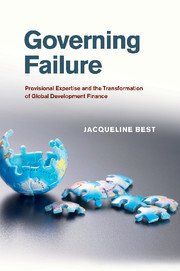Acknowledgements
In the almost seven years that I have been working on this book in one form or another, I have collected a number of debts to colleagues, research assistants and friends.
I would like to start by thanking those colleagues who generously commented on one or more chapters of the final manuscript, including Michael Orsini, Paul Langley, Michael Best, Tony Porter, André Broome and William Walters. A number of others have commented over the years on earlier versions of these chapters, including Mat Paterson, Alexandra Gheciu, Iver Neumann, Lindsey McGoey, Stefano Guzzini, Arne Rückert, Ole Jacob Sending, Len Seabrooke, Rob Aitken, David Black, Rodney Bruce Hall, Kate Weaver, Mark Blyth, Charlotte Epstein, Eric Helleiner, Bessma Momani, Randall Germain and Susan Park.
Earlier versions of several chapters were presented at a number of workshops, conferences and talks. Many of these talks provided crucial feedback on the central theoretical and methodological arguments of this volume. I was particularly inspired by the discussions during workshops at the Copenhagen Business School on “The Business of International Organizations,” and at the European Consortium for Political Research on “Diffusion of Authority,” together with talks at the University of Queensland, the University of Oxford, the Norwegian Institute of International Affairs, the North-South Institute, the University of Warwick and the University of Sydney.
I am fortunate to be working in an environment where I am surrounded by some excellent minds. Many of the ideas in this book are inspired by conversations with friends and colleagues at the University of Ottawa and Carleton University, including Kevin McMillan, Dalie Giroux, Stephen Brown, Nisha Shah, Paul Saurette, Susan Spronk, Patrick Leblond, Laura Macdonald, Hélène Pellerin, Kathryn Trevenen and Marie-Josée Massicotte. I am also indebted to the participants of the International Political Economy Network seminar at the University of Ottawa where I was able to present an overview of the project towards the end of the writing process.
I benefitted from some excellent research and editorial assistance in producing this volume. I would particularly like to thank Marie Langevin and Kailey Cannon for their superb research and editorial skills, without which this book would not have been possible. Phillipe Roseberry, Robert MacNeil, Maxime Ouellet and Dan Furukawa Marques also helped enormously through their research assistance.
The research for this book was supported financially by the Social Sciences and Humanities Research Council of Canada, together with the Faculty of Social Sciences at the University of Ottawa. I also benefitted from research leave spent at the University of Oxford – where I enjoyed support from the Global Economic Governance Centre, the Department of International Development and the Institute for Science, Innovation and Technology – and at the University of Queensland’s School of Political Science and International Studies. I would like to thank Ngaire Woods, Rodney Bruce-Hall, Steve Woolgar and Roland Bleiker for making me welcome at these institutions.
I was also fortunate in being able to benefit from access to several archival collections in researching this book, including the International Monetary Fund (IMF) Archives, the World Bank Archives and the British National Archives. Premela Isaac and Jean Marcoyeux at the IMF Archives and Sherinne Thompson at the World Bank Archives provided invaluable assistance.
Parts of Chapter 5, “Fostering ownership,” appeared in Third World Quarterly, 28 (3), 2007, and parts of Chapter 7, “Managing risk and vulnerability,” appeared in Third World Quarterly, 34 (2), 2013. Both are reproduced here with the permission of Taylor and Francis, www.tandfonline.com.
Figure 8.1, “The LOGFRAME,” is reproduced from a report prepared for the United States Agency for International Development (USAID): Project Analysis and Monitoring Company. 1980. “The Logical Framework.” Prepared for the United States Agency for International Development, Document # PN-AAR-443. Washington, DC. The report is available through the USAID Development Experience Clearinghouse: http://pdf.usaid.gov/pdf_docs/PNAAR443.pdf.
Figure 8.2, “CIDA results chain,” is reproduced from a Government of Canada official document: CIDA. 2008. “Results-based Management – 2008 Policy Statement: Amended Terms and Definitions.” Gatineau: Canadian International Development Agency. Available from www.acdi-cida.gc.ca/acdi-cida/acdi-cida.nsf/eng/ANN-102094249-J4B. The reproduction has not been produced in affiliation with, or with the endorsement of, the Government of Canada.
Finally, I would like to thank my husband and partner, Paul Tyler, for his support and encouragement over the past years as I navigated the ups and downs of the research and writing process.

